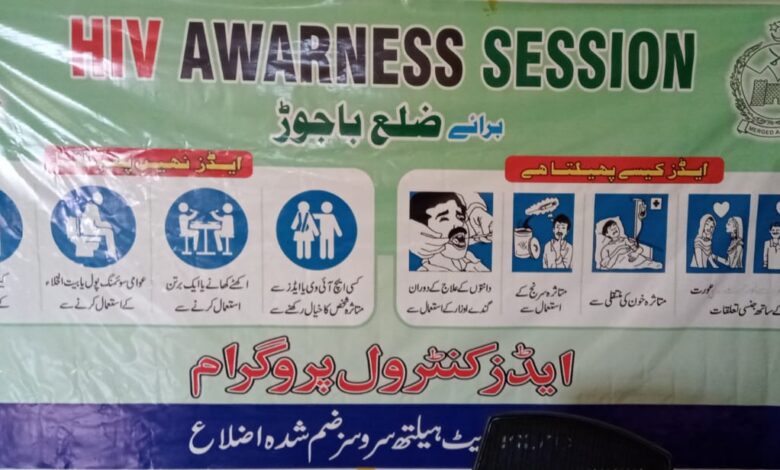
Gul Agha (pseudonym), once a migrant laborer traveling across borders and within the country, found himself rooted in Bajaur district, Khyber Pakhtunkhwa, for the past three years, working locally to support his family.
Amidst his daily grind, persistent fevers and physical weakness began to plague him. Gradually, his strength waned to the point where walking became daunting.
Various treatments were attempted but to no avail. Only when he sought help at the District Headquarters Hospital Khar, his condition took a surprising turn. Tests revealed that Gul Agha was grappling with AIDS.
Unfamiliar with the disease, he received free medications and crucial advice on precautions. Today, he stands able to work and function like any other ordinary person.
Beyond Sexual Transmission: The Reality of AIDS
The common perception is that AIDS is spread only through unprotected sex. In this regard, Dr. Ajmal Khan, head of the TB and AIDS control program of Bajaur district, said that this perception is completely wrong because the disease of AIDS is not only caused by having sex with a non-male or female, but it is like other common diseases. It is transmitted from one person to another in different ways.
Also Read: Taekwondo Prodigy Ayesha Ayaz Champions Education for Young Cyclist Abuzar
Ajmal Khan said that using the instruments used in treatment for more than one patient, not using new blades for shaving, unprotected and unnatural sex, and transfusion of blood from an AIDS-infected person to a common patient. Even this disease can affect a healthy person.
Living with AIDS: Gul Roosh Khan's Story
Gul Rawish Khan (pseudonym), 45, of Bajaur was also diagnosed with AIDS three years ago. He said that he used different types of drugs in different ways, including injecting drugs.
According to Rawish, one injection was used by many people during intoxication. He had constant fever, headache, and weakness in the body, but when the doctor conducted various tests, it was found that he was infected with AIDS. Now he has given up addiction and is using medicine regularly and is living like a normal person and supporting his family.
Numbers and Realities: AIDS in Pakistan
According to the data provided by Dr. Ajmal, the number of registered AIDS patients in Pakistan is 160,000, including 15,000 in Khyber Pakhtunkhwa, 75,000 in Punjab, 60,000 in Sindh, and 5,000 in Balochistan. Among them, some patients do not have active symptoms of AIDS but still, they are taking their treatment regularly.
Dr. Ajmal said that among the 170 registered AIDS patients of Bajaur, some have been registered in Hayatabad Medical Complex Peshawar and are now being referred to Bajaur on a priority basis so that they can be treated in their native areas.
AIDS Awareness Initiatives in Bajaur
Initiatives for AIDS awareness in Bajaur include seminars and regional sessions involving religious, political, social, and tribal leaders. These sessions aim to dispel misconceptions and encourage individuals to seek treatment. Additionally, an annual awareness walk on World AIDS Day, December 1st, serves as a communal effort to raise awareness.
Dr. Ajmal calls for cooperation from the community to prevent the alarming spread of AIDS. Timely treatment and transparency in diagnosis are vital to curbing the epidemic's reach in Bajaur. The call is clear – combatting stigma, fostering awareness, and embracing treatment are pivotal steps in navigating the reality of AIDS in this region.